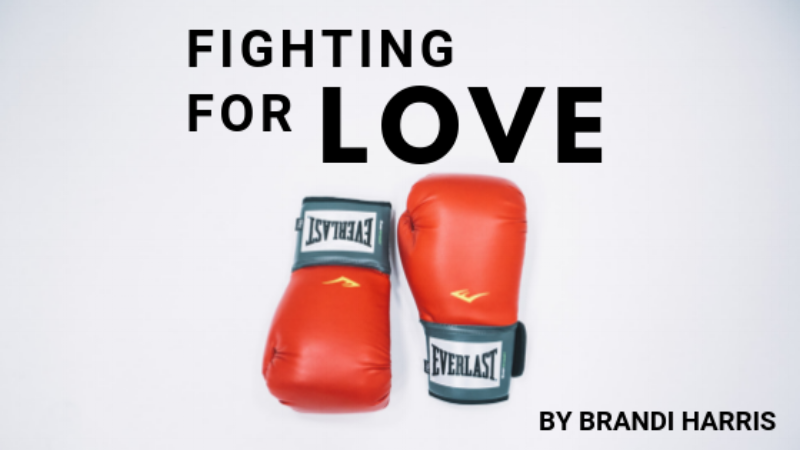
Fighting for Love- Part 1
by Brandi Harris
“Greater love has no one than this: to lay down one’s life for one’s friends.” John 15:13
To love sounds like a sweet, gentle, easy kind of thing, but it is not. Or at least I should say, it is not always that. There are a lot of times that loving means doing the hard thing. The really hard thing: Saying no to a something good, because it’s not the right time or place. Not letting your kids have all the ice-cream they want. Momentarily walking away from your hurting spouse because staying in the same room means you will hurt each other even more. Letting your friend know that you DO NOT like his behavior, or that it is hurting you, which feels like a form of rejection, which carries with it the risk of counter-rejection. Letting go of control over something because you are not good at controlling it. Placing your kids in the hands of another competent person because you can’t do what needs to be done to help them. Standing up against behaviors that destroy love. Saying no to enabling a person who is destroying himself. Sharing the most vulnerable parts of yourself, even though you’re terrified. Laying down your life.
data-animation-override>
“Fighting for love often includes conflict with the very person you are trying to love.”
But loving well is a tough skill to master. One way to get better is to recognize that love can’t grow in a hostile environment. The space between people, where love or hate grows, is often invaded by all kinds of fear, lies, hate, and hurt. Either person in the relationship can take responsibility to fight for love in that space instead.
Fighting for love often includes conflict with the very person you are trying to love.
Conflict is like washing dishes… You use your dishes every day and every day they get a bit of gunk on them. You wash them because if you don’t they’ll start stinking. If you persist in eating off dirty dishes, they’ll eventually make you sick. Even the most delicate of dishes have to be washed, if they’re to be used for any practical purpose.
Most of us are afraid of conflict because we’ve had a bad experience with it. Remember that time your great aunt asked you to wash the teacups and the only thing you could find under the cabinet to wash with was a wire brush? And you just went for it because you were kind of mad at Aunt Mothball anyway? Maybe you’ve been the teacup in that scenario. Maybe you’ve been the wire brush. Either way you’ve learned that washing dishes can be a terribly destructive activity.
But good conflict means getting to eat off clean dishes. Washing dishes well means using one of those sponges that’s soft and yellow on one side and a bit rough and green on the other. We use warm water, which is more sanitary and more comfortable. We use soap. We use the right amount of pressure at the right time.
data-animation-override>
“Good conflict has all the same ingredients: a loving “washer;” a safe, comfortable environment; cleansing truth, applied liberally; and discernment for when to be firm and when to be gentle.”
Good conflict has all the same ingredients: a loving “washer;” a safe, comfortable environment; cleansing truth, applied liberally; and discernment for when to be firm and when to be gentle.
Living day to day, all relationships get dirty. Humans very naturally hurt each other, are selfish, and generally see things uniquely, so without regular, healthy communication, we’re bound to misunderstand one another. The way we communicate often determines whether or not we can reconcile these differences. The two things I see missing the most are gentleness and honesty.
“Brothers and sisters, if someone is caught in a sin, you who live by the Spirit should restore that person gently. But watch yourselves, or you also may be tempted.” Galatians 6:1
Fighting for love with honesty means stepping into that space between us and saying what we are actually seeing and feeling.
When we avoid conflict, the space between us gets gunked up with dishonesty. If I get my feelings hurt and never let my friend know, we move on in “peace” but only on the surface because I am pretending, or in other words: lying. Underneath, my hurt festers and eventually results in passive aggression or emotional distance. My friend who loves me may not even know I’m hurt. And if he doesn’t know I’m hurt, he may not change his behavior. Then I start to assume he doesn’t WANT to make any changes because he doesn’t love me. We keep using the dishes, but with last night’s lasagna caked on the side. Eventually someone gets sick.
“A gentle answer turns away wrath, but a harsh word stirs up anger.” Proverbs 15:1
When we confront each other without grace, we gunk up the space with harshness. We break our teacups. If I accuse my friend of disrespecting me and not valuing our friendship when he shows up late for things WITHOUT asking him what’s up and letting him know it’s starting to hurt, I am destroying the potential for a healing conversation. My friend, who loves me, hears me accuse him of intentional disrespect and hears my judgement on his values and immediately assumes I don’t really love him or want a relationship with him. He no longer trusts me and the teacup breaks.
When we are ready to fight for love in the space between us, we gracefully hold one another accountable by speaking gently and honestly to one another. We don’t say, “I’m fine,” when we’re not fine. We don’t say, “Don’t worry about it,” when we feel taken advantage of. We don’t remain silent when we’re starting to lose trust in one another. And we don’t assume and accuse without giving our friends a chance to speak for themselves.
Instead, we believe the best about each other, speaking the truth gently, hoping for reconciliation. We say, “I’m hurt,” or “I’m confused,” or “I’m annoyed.” We say, “What’s going on?” or “Why are you doing it like that?” or even, “I don’t like this.” We are offering our friends an opportunity to make things right. This is fighting for love.

Check out our most recent series: The “S” Word
The “S” Word- Week 1
Scripture Reference:
“Submit to one out of reverence for Christ” Ephesians 5:21 NIV
“Who is more important, the one who sits at the table or the one who serves? The one who sits at the table, of course. But not here! For I am among you as one who serves.” Luke 22:27 NLT
Matthew 26:39, 41 NLT
Matthew 26:52-53 NIV